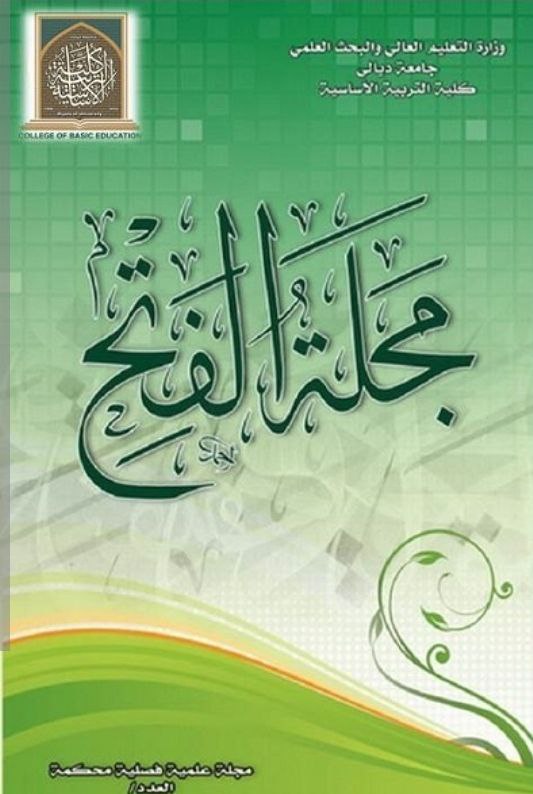Developing speaking Fluency of University of Technology' MSc students by Using the 4/3/2 Technique Developing speaking Fluency of University of Technology' MSc students by Using the 4/3/2 Technique
DOI:
https://doi.org/10.23813/FA/24/4/21Keywords:
Keywords: speaking, fluency development, the 4/3/2 techniqueAbstract
In the new. global world. EFL teaching.gradually changed from a traditional.grammar-based model way of teaching to a communicative. Language. Leaching approach to teaching. So, a variety of methods. was appeared. to help the EFL learners. to develop. their speaking. skills. This is lack of speaking fluency practice sometimes, is not sufficient to maintain a communicative task in EFL class. Therefore, this study is an attempt to develop the speaking skills of 53 MSc students at University of Technology. By using a pre and post-test , the researcher collect the data then analyze results which show that there is a good portion of development in students' speaking skills after using this the 4/3/2 technique.
References
Ajie, Zhou. A Further Study of the Effects of the 4/3/2 Technique on Spoken English Production. Retrieved on 28 May 2013.
http://www.celea.org.cn/teic/65/65-12.pdf
Bamford, Julian and Ricard R. Day. Extensive Reading Activities for Teaching Language. Cambridge: Cambridge University Press, 2004.
Brown, H. Douglas. Teaching by Principles:An Interactive Approach to Language Pedagogy. New York:Prentical Hall Regents Prentice-Hall,Inc, 1992.
……………………, Language Assessment: Principle and Classroom Practices. New York: San Francisco State University, 2004.
Christina and Isabelli Gercia. Development of Oral Communication Skill of Abroad. (Retrieved on February, 22 2012),http://174.120.165.92/overview/domain.aspx?q=frontiersjournal.com
Cohen, Louis. Lawrence Manion And Keith Morrison. Study Methods in Education. Six Ed. New York: Routledge, 2007.
Cyril, J. Weir. Communicative Language Testing. New York: Prentical Hall, 1990.
Dina, Al-Sibai. Oral Fluency.2004. (Retrieved on February, 29 2012)http://faculty.ksu.edu.sa/dinaalsibai/Study%20Papers/12.%20Oral%20 Fluency%20Lit%20Review.pdf
English, Eve and John Williamson.Meeting the Standards in Primary English. New York: Routhledge Falmer, 2005.
Fillmer, H. Thompson. Patterns of Language. New York: Litton Educational publishing, Inc., 977.
Gay, L.R and Peter Airasian. Educational Study Competencies for Analysis and Application.Sixth Ed. New Jersey: Prentice-Hall, Inc., 2000.
Hasibuan Kalayo and Muhammad Fausan Ansyari. Teaching English as a Foreign Language (TEFL). Pekanbaru; Alaf Riau Graha Press, 2007.
Hedge, Tricia. Key Concept in ELT. Article ELT Journal Volume 47/3 July 1993
http://eltj.oxfordjournals.org/content/47/3/275.full.pdf. 26. (Retrivied on January, 18 2012)
Huges, Arthur. Testing for Language Teacher.Cambridge: Cambridge University Press, 2005.
Jhon.W.Cresswell. Educational Study: Planning, Conducting, and Evaluating Quantitative and Qualitative Study. New Jersey: Pearson Education,2008.
Jong, Nel De. Developing Fluency. retriveRetrievehttp://learnlab.org/uploads/mypslc/talks/lotecolloquium_ march08_2.ppt (Retrieved on December, 28 2012),
Louma, Sari. Assessing Speaking. Cambridge: Cambridge University Press, 2004.
Marian, J Rossiter, et al. Oral Fluency: The Neglected Component in the Communicative Language Classroom. 2010. Unpublished.
M. Syafi’i S. Et al. The Effective Paragraph Developments: The Process of Writing for Classroom Setting. Pekanbaru: LBSI, 2007.
Muijs, Daniel. Doing Quantitative Study in Education. London: Sage Publication, 2004.
Nation, I S P., and J Newton. Teaching ESL/EFL Listening and Speaking. New York:Routledge, 2009.
………….,Improving Speaking Fluency. Great Britain:Pergamon Press Plc, 1990.
Nunan, David. Practical English Language Teaching. Sydney: McGraw Hill, 2003.
Radford, Andrew. English Syntax. Cambridge: Cambridge University Press, 2004.
Ricard, Jack C., John Platt, and Heidi Platt. Language Teaching and Applied Linguistics. Harlow: Longman, 1992.
Schmidt, Rhicard. Psychologycal Mechanisms Underlying Second Language Fluency.http://nflrc.hawai.edu/PDfs/Schmidtpsychologicalmechanismsund erlyingscodlanguagefluency.pdf. Retrivied on: June 19 2012 (11.56 a.m)
Sr, Jemes D. Lester, and James D. Lester, Jr. Writing Study Papers. A Complete Guide. Eleventh ed. New York: Pearson Longman, 2005.
Singh, Yongesh Kumar. Fundamental of Study Methodology and Statistics. New Delhi: New Age International Publisher, 2006.
Suryawira, Charisudin. The Effect on the Students’ Oral Fluency at SMPN5 Malang. Retrieved on 28 May 2013. http://karyailmiah. um.ac.id/index.php/sastra-inggris/article/view/18214
Thornbury, Scott. An A-Z of ELT: A Dictionary of Terms and Concepts used in English Language Teaching. Malaysia: Macmillan, 2006. Learning English. British Broadcasting Corporation: World Services. 2003
Ur, Penny. A Course in Language Teaching: Practice and Theory. New York: Cambridge University Press, 1991.
Downloads
Published
How to Cite
Issue
Section
License
Copyright (c) 2023 بان كاظم عبد

This work is licensed under a Creative Commons Attribution 4.0 International License.
حقوق النشر والترخيص
تطبق مجلة الفتح للبحوث التربوية والنفسية ترخيص CC BY (ترخيص Creative Commons Attribution 4.0 International). يسمح هذا الترخيص للمؤلفين بالاحتفاظ بملكية حقوق الطبع والنشر لأوراقهم. لكن هذا الترخيص يسمح لأي مستخدم بتنزيل المقالة وطباعتها واستخراجها وإعادة استخدامها وأرشفتها وتوزيعها ، طالما تم منح الائتمان المناسب للمؤلفين ومصدر العمل. يضمن الترخيص أن المقالة ستكون متاحة على نطاق واسع بقدر الإمكان وأن المقالة يمكن تضمينها في أي أرشيف علمي.
لمزيد من المعلومات، يرجى متابعة الرابط: https://creativecommons.org/licenses/by/4.0/.



